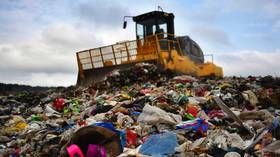'World-renowned' companies aren't following Russia's recycling laws & are lying to authorities about it, says environment minister

Major "world-renowned" companies are deceiving the Russian government by providing false information on the disposal of packaging and goods, violating the country's extended producer-responsibility laws, including recycling.
That's according to Alexander Kozlov, Russia's Minister of Natural Resources and Ecology, who told Moscow daily RBK that these large businesses want to avoid the additional costs of looking after the environment.
"We need to take control because, in the reports of some world-renowned companies, we see how they cheat us without shame," Kozlov said.
Russia has had an Extended Producer Responsibility (EPR) mechanism in place since 2015. The manufacturer is supposed to either dispose of goods and packaging itself or pay a fee for another company to do it. According to Russia's environmental watchdog Rosprirodnadzor, the date-data for 2020 shows that only 20,000 out of 4 million companies submitted their reports.
Also on rt.com Russia could impose ban on ALL disposable plastic goods in next two years as country begins battle against non-recyclable productsAt the start of next year, passed recycling reforms will be fully implemented that will include enforced recycling of 100% of packaging. The Ministry of Natural Resources and Ecology predicts that after implementing the reform, the environmental tax received by Moscow may increase to 136 billion rubles ($1.8 billion a year).
The reform has come under attack by businesses, but the ministry is in no mood to change its mind, Kozlov explained.
"We are feeling all sorts of pressure, including using the media. But this is a strategy. It must be implemented," the minister concluded.
Last month, it was revealed that the same ministry proposed a ban on 28 single-use goods in Russia, including plates, glasses, cup lids and coffee capsules.
Also on rt.com Russia to impose ban on cotton swabs and plastic utensils as country begins crackdown on hard-to-recycle & non-recyclable productsThink your friends would be interested? Share this story!













